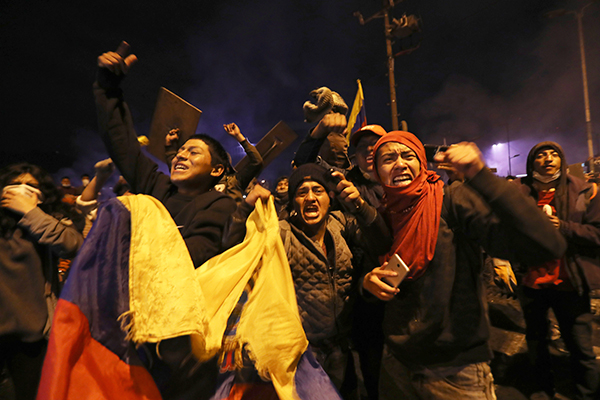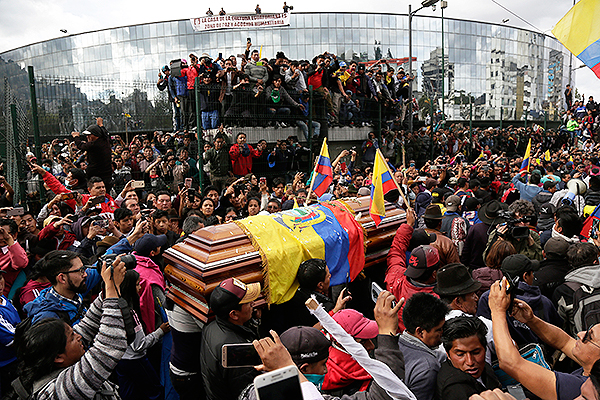Upsurge of Protests in Latin America
| revcom.us
The recent months have seen an upsurge of anti-government protests in a number of countries in Latin America. On this page are pictures and short accounts of some of this struggle. The economies and political structures of all these countries have long been dominated by U.S. imperialism, even as other imperialist powers are increasingly contending in this region.
Chile
On October 6, Chilean president Sebastián Piñera announced a drastic fare increase for the metro rail system. This was a new attack on the masses of Chileans who already found life unbearable, from the increasing burden of debt to cuts in pensions and health care and rising costs of electricity and other necessities. There has been widespread discontent over government corruption scandals and the repression of student movements. The fare increase set off waves of peaceful protest, from people taking to the streets banging on their pots and pans (a traditional form of protest in Chile) to a new form: the “evasions,” spread on social media, where people assemble at a metro station at a specified time and board trains en masse without paying. By the end of last week, clashes between protestors and police had resulted in 308 reported arrested and 167 injured. On Friday, dozens of the metro stations were attacked and burned. By Saturday, Piñera had declared a state of emergency in the capital of Santiago and sent in the military, complete with tanks, water cannon, and soldiers. Before the day was over, this was extended to other major areas in Chile. By the end of the day, he suspended the fare increase, amid widespread calls for his resignation, but within hours the military had declared a two-week curfew. The situation remains very tense.
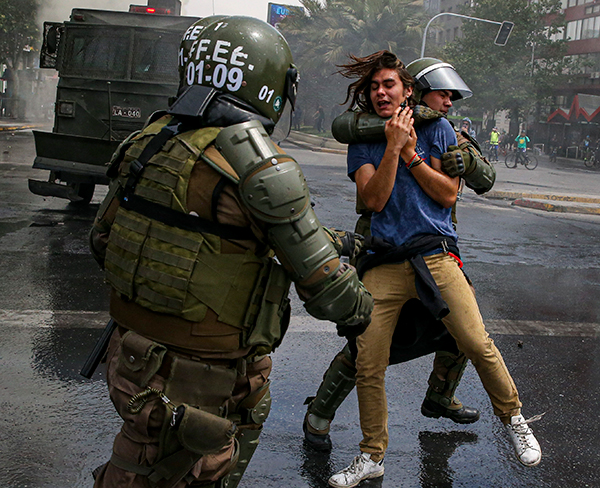
During the week of October 6, clashes between protestors and police had resulted in 308 reported arrested and 167 injured. Photo: AP
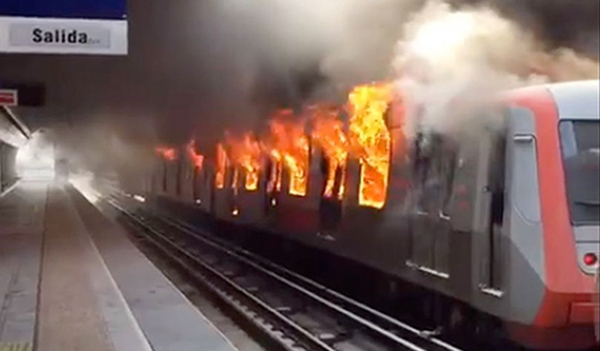
A fare increase set off waves of peaceful protests on Sunday, October 6, but by Friday dozens of the metro stations were attacked and burned. Photo: Video screen capture
Ecuador
For the first half of October, Ecuador was turned upside down by a powerful upheaval against new austerity measures, which included the elimination of fuel subsidies in this oil-producing nation. These measures were devastating to the large indigenous population of Ecuador, as well as taxi, bus, and truck drivers, and the cuts in public worker benefits and wages hit even more broadly. Submitting to demands of the International Monetary Fund, President Lenín Moreno, announced the austerity measures on October 1. Massive protests erupted on October 3. The next day, Moreno declared a state of emergency. But the protests escalated, and on October 8, the president fled his offices in the capital city of Quito to Guayaquil on the coast. As the struggle continued to mount, Moreno reached a deal with some leaders of the indigenous groups, withdrawing the austerity decree in exchange for an end to the demonstrations. But the government is viciously striking back. Seven people were reported killed in the protests, and a number of opposition leaders have fled the country. Many protesters who were arrested are facing heavy jail time. At least one major labor organization has denounced the settlement and called for protests to resume at the end of the month.
Peru
In 2011, the Peruvian government gave a license to Southern Copper Corp., a Mexican corporation, to start an enormous copper mining project in the Tambo Valley in southern Peru. Farmers and others in the region recognized that the project would cause massive pollution to the land and water, devastating agriculture, the environment and the peoples’ livelihood. In 2011 and again in 2015, they waged intense battles against the project, causing it to be suspended in 2015. When it was again started up earlier this year, the masses again rose up in protest. They marched in their thousands in the nearby city of Arequipa. They blocked the port of Matarani. They blocked highways. And they waged intense militant battles with the police. In August, the government temporarily suspended the mining company’s license “for further evaluation.” But the protests have continued.
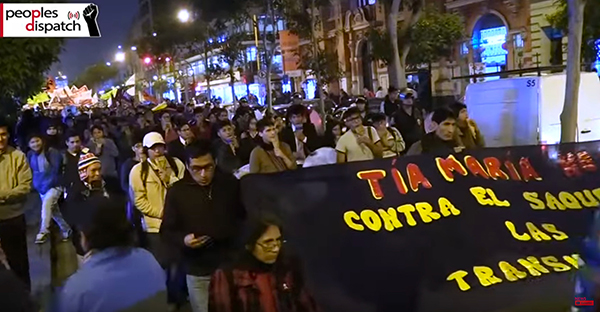
The farming community in Tambo Valley fearing it would lose vast tracts of agricultural land if the mine is built, marched in their thousands in the nearby city of Arequipa. Photo: Peoples Dispatch
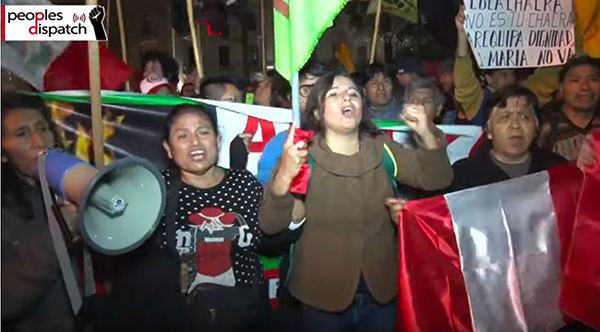
People have protested the Southern Copper plans for US$1.4 billion Tia Maria copper mine in Arequipa, Peru since 2010. Once again the protests have intensified. Photo: Peoples Dispatch
Imperialism means huge monopolies and financial institutions controlling the economies and the political systems—and the lives of people—not just in one country but all over the world. Imperialism means parasitic exploiters who oppress hundreds of millions of people and condemn them to untold misery; parasitic financiers who can cause millions to starve just by pressing a computer key and thereby shifting vast amounts of wealth from one place to another. Imperialism means war—war to put down the resistance and rebellion of the oppressed, and war between rival imperialist states—it means the leaders of these states can condemn humanity to unbelievable devastation, perhaps even total annihilation, with the push of a button.
Imperialism is capitalism at the stage where its basic contradictions have been raised to tremendously explosive levels. But imperialism also means that there will be revolution—the oppressed rising up to overthrow their exploiters and tormentors—and that this revolution will be a worldwide struggle to sweep away the global monster, imperialism.
—Bob Avakian, BAsics 1:6

